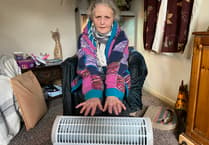Crisp packets, sweet wrappers and other flexible plastics could soon be easier to recycle in Somerset as part of a new trial.
Flexible plastics – which also includes bread bags, cheese wrappers and salad bags – are currently some of the hardest items to recycle, despite taking up a sizeable chunk of household waste.
The government has been running a pilot scheme since April 2022 with three local authorities (including two in Gloucestershire), with flexible plastics being collected at the kerbside for processing and recycling.
The Somerset Waste Partnership (SWP) has now confirmed that parts of Somerset will join the pilot in April 2023, allowing these materials to be collected for the next two years.
Flexible plastic packaging represents nearly a quarter of all UK consumer plastic packaging but only six per cent is currently recycled.
In Somerset, flexible plastics made up around eight per cent by weight of residual waste (i.e. the contents of the large black bins) in 2018 – and there is no indication that this has declined since the Recycle More scheme was implemented.
Flexible plastics – which include plastics with laminated foil layers, such as food pouches – are difficult to sort and recycle; since they are often made of low-value material, it is difficult for them to be sold on to companies who reprocess them, and they cannot easily be reused for the same purpose.
The government has pledged to ensure that flexible plastics can be recycled nationally by residents and businesses by 2027 – with the current trial being one step on the road towards that.
SWP managing director Mickey Green laid out the details of the trial at the final meeting of the SWP joint scrutiny panel on February 8.
He said in his written report: “Somerset has been chosen to represent a rural area with some levels of deprivation. The pilot area to be chosen needs to take this into account.
“Due to space constraints and capacity issues at the depots, the pilot will need to be run from our Evercreech depot.
“Flexible plastics that will be accepted are plastic bags and wrappers – for instance, bread bags, frozen food bags, salad bags, cheese wrappers and similar.
“It is expected that crisp packets and sweet wrappers will also be included.We await confirmation as to whether ‘wet’ materials, such as pet food pouches and baby food pouches, will be included.”
The first stage of the pilot in Somerset will comprise around 3,500 properties in the Mendip district (which includes Frome, Glastonbury, Shepton Mallet, Street and Wells) and will last for around 12 months.
The second stage will run from a further year and will see the collections extended to a further 15,000 to 20,000 households – though it has not yet been decided which parts of Somerset will take part in this stage.
Each participating household will receive information leaflets at least four weeks in advance of the trial, and will be sent “blue translucent bags” into which their flexible plastic can be placed, rather than mixing it up with the existing materials which are collected at the kerbside.
Aside from some staffing costs, the trial is being funded by the Flexible Plastic Fund, meaning there will be little additional pressure on council tax payers.
Where possible, the materials will be processed and recycled – but as a last resort, they will either be “down-cycled” into benches or burned to generate energy.
The pilot scheme is due to conclude in 2025, after which the government is expected to bring forward new legislation to enable it to hit its 2027 target.




